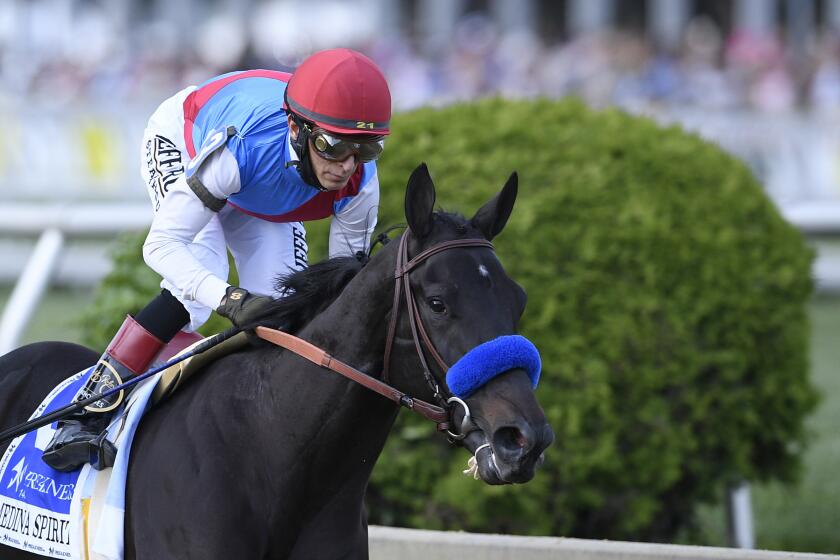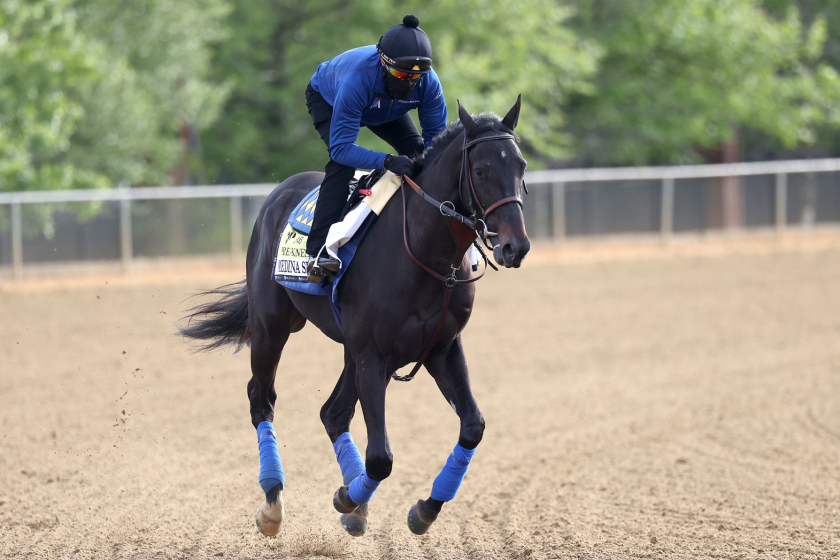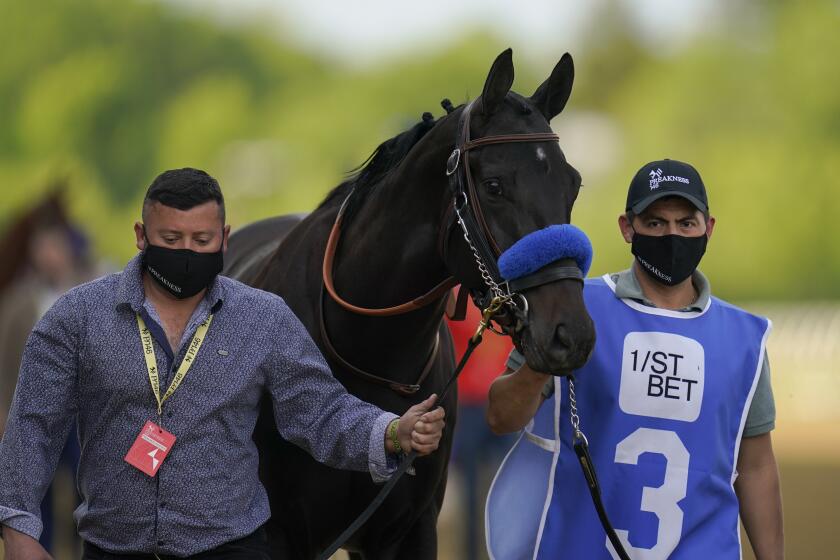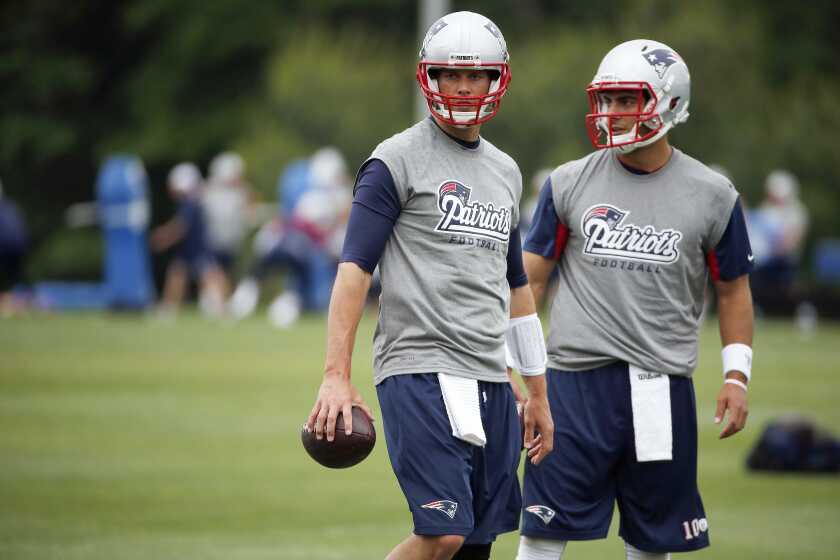State horse racing board’s new equine medical director accused of violations
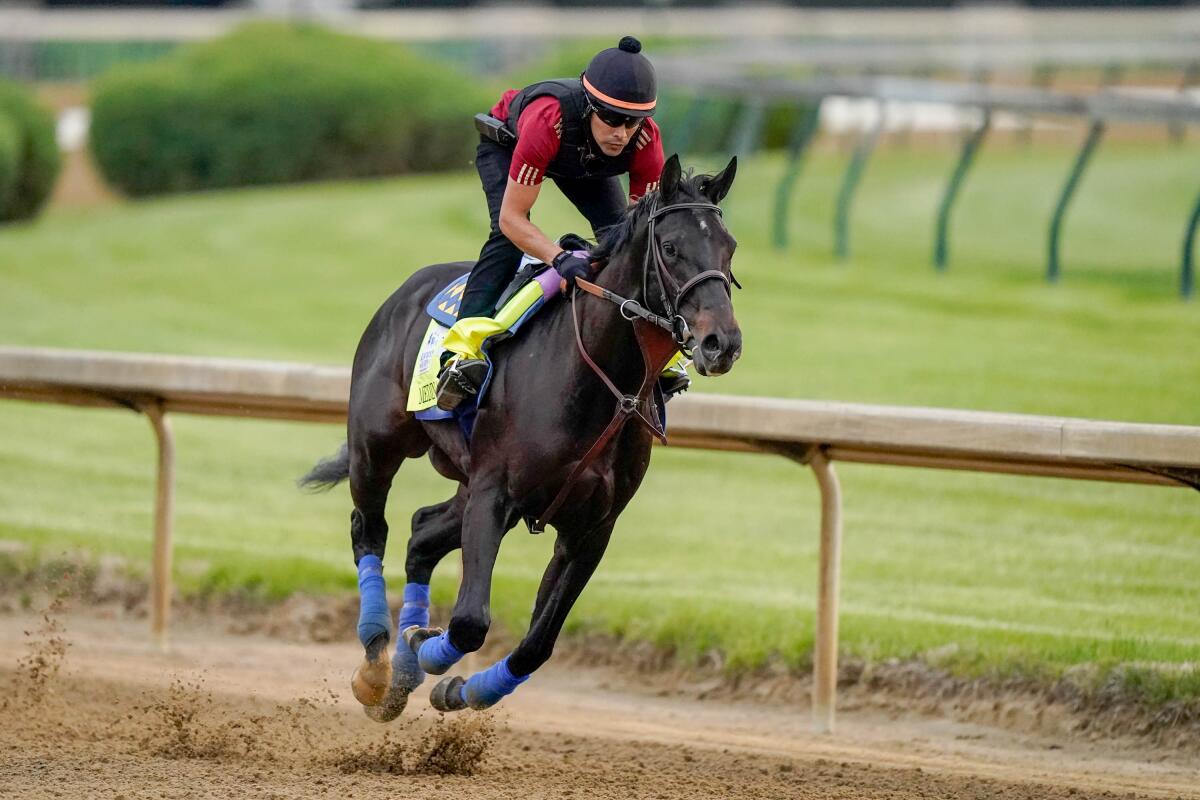
The California Horse Racing Board, which has bounced from crisis to crisis the past few years, now finds its newly appointed equine medical director under suspicion from another state regulatory agency.
Dr. Jeff Blea, who is in charge of the investigation into the death of Kentucky Derby winner Medina Spirit, was hit with a 27-page “accusation” by the state Veterinary Medical Board on Dec. 17 alleging he violated several state regulations in the year prior to being named equine medical director July 1.
The investigation started in February after the VMB received an anonymous tip that Blea and other veterinarians prescribed and gave medications without examinations or medical necessity. Veterinarians Vince Baker and Sarah Graybill Jones also were issued complaints. Among the drugs named in Blea’s complaint was thyroxine, a thyroid hormone supplement whose use in horses has been controversial. The CHRB was not aware of the VMB investigation into Blea.
An emergency hearing has been scheduled for Friday to determine whether Blea’s license should be temporarily suspended. There is nothing in the law that says the California equine medical director must have a veterinary license.
Blea declined to comment on the hearing or the charges.
“I have known and worked with Dr. Blea for more than 20 years, and during that time I have never met a veterinarian more committed to caring for horses,” said Scott Chaney, CHRB executive director. “From my perspective, he has always displayed high ethical standards. In short, he has dedicated his life to the protection and promotion of animal welfare. I look forward to Dr. Blea continuing to serve the CHRB and the horse-racing industry during the due process phase of this matter.”
Medina Spirit, who died Monday at Santa Anita, was an underdog who won the Kentucky Derby. But a potential disqualification could alter how he is perceived.
The complaint alleges eight causes for discipline.
- Negligence for prescribing, dispensing or administering a drug or medicine without examining a horse or forming a diagnosis. The complaint cites six horses he treated. The horses are not named, but identified by initials. All the allegations involve the same set of horses.
- Dispensing dangerous drugs without medical necessity involving six horses. Despite the “dangerous” label, most of the drugs are commonly used, such as Lasix and vitamins.
- Failure to establish veterinarian-client-patient relationship involving three horses. An example listed was performing an endoscopic exam without documenting an examination of the horse or communicating the treatment with the trainer or owner.
- Violation of the practice act and board regulations in regard to recordkeeping in the case of six horses. It cited a failure to note such information as age, sex, breed and color of a horse as well as medication, diagnosis and prognosis.
- Use of misbranded drugs, in one case involving Thyroxine L powder, which is not FDA approved.
- Possession or use of prohibited drugs in 10 cases. Five of the cases involve aspirin powder, which is not FDA approved for veterinary patients.
- Failure to provide required drug consultation in eight cases. It cited instances where the medical record failed to note the required consultation for usage of the drug.
- Improper recordkeeping in one case of anesthesia. The charge cited that the record did not document a required examination 12 hours before administering a general anesthesia.
U.S. Sen. Dianne Feinstein wants California’s horse racing board to update her office regularly regarding the Medina Spirit death investigation.
Compared to the veterinary violations alleged by the federal government in the indictments that included several veterinarians and trainers Jorge Navarro and Jason Servis in March 2020, these potential infractions are considered minor and in many cases little more than incomplete recordkeeping.
However, Blea, as the state’s top regulatory equine veterinarian, is ostensibly charged with enforcing these kind of rules.
“We are surprised and disappointed that the Veterinary Medical Board would file a complaint during this time when the advice and counsel of our recently hired EMD is so crucial,” said Greg Ferraro, CHRB chairman. “The CHRB has accomplished incredible reforms in the last two years, but clearly more work is needed. We continue to work hard to reform the industry and make horse racing safe for all involved.”
The CHRB has been under fire in recent years since its handling of the positive drug test of 2018 Triple Crown winner Justify because of contamination and its inability to stem the rise in fatalities at Santa Anita in 2019. The board has mostly new members, including a new chairman, vice chairman and three other board members in addition to a new executive director, assistant executive director and equine medical director.
The board was put in the spotlight at the recently concluded Breeders’ Cup at Del Mar when a miscommunication between a track veterinarian and the stewards resulted in a horse running for purse money only — you couldn’t bet on him — infuriating bettors when the horse won the race. Blea and Chaney were tasked with explaining the gaffe to the media, even though neither was directly involved in the incident.
The recent death of Medina Spirit, after a possible heart attack following a workout at Santa Anita, has also pushed Blea and the CHRB to the forefront of public perception. Chaney has called it perhaps the most important necropsy the CHRB has ever performed and Blea is in charge of it. Sen. Dianne Feinstein (D-Calif.) has called for transparency and wants her office updated on the progress.
Medina Spirit, the 2021 Kentucky Derby winner, died at Santa Anita on Monday. Here’s what you need to know about the Bob Baffert-trained thoroughbred.
Gov. Gavin Newsom has pushed a reform agenda for a newly constituted board stressing horse safety. Many of the regulations put in place by the board are thought to have greatly reduced the number of fatalities since 2019, but the group remains split as to how aggressively to implement change.
At the December meeting, vice chair Oscar Gonzales wanted to cut the length of Golden Gate’s license application to three months and then review after a cluster of fatalities at the Northern California track. But his effort was quashed 4-3, with the deciding vote being cast by chairman Ferraro. Golden Gate was granted a six-month license.
Regardless of the outcome of Blea’s hearings and subsequent procedures, the board will have to deal with the unanswered question of how it was caught unaware of this veterinarian board investigation.
More to Read
Go beyond the scoreboard
Get the latest on L.A.'s teams in the daily Sports Report newsletter.
You may occasionally receive promotional content from the Los Angeles Times.
